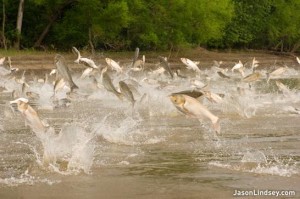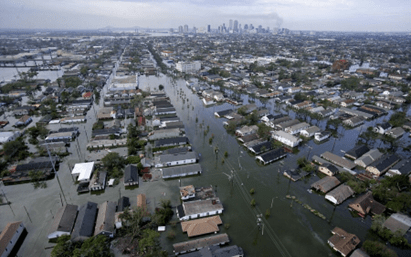We have much more to do and your continued support is needed now more than ever.
Help Defend the Great Lakes from Asian Carp
 If you live in the Great Lakes region, you have a tremendous opportunity to stand up and protect them by voicing your support for a plan to keep Asian carp and other invasive species out of the Great Lakes.
If you live in the Great Lakes region, you have a tremendous opportunity to stand up and protect them by voicing your support for a plan to keep Asian carp and other invasive species out of the Great Lakes.
A few days ago, the U.S. Army Corps of Engineers released a long-awaited report that examines options to prevent the spread of various invasive fish, parasites, grasses, algae, and other organisms from the Mississippi River to the Great Lakes and vice versa.
The report shows unequivocally that physically separating the Great Lakes and Mississippi River systems is the most effective way to stop the transfer of harmful invasive species from one body of water to the other.
Unfortunately, the report also contains options that do not adequately protect the Lakes.
Speaking up at the public hearing is a critical chance to tell the U.S. Army Corps to pursue the one real solution to defend the Great Lakes from Asian carp, because actions that do not move us toward this goal are a distraction that further delays the permanent solution so desperately needed.
Asian Carp Pose Urgent Threat to Great Lakes
Asian carp are non-native fish that pose a threat to people and wildlife. The skittish fish can weigh upwards of 60 pounds and become easily startled—hurling themselves out of the water at the sound of boats. The fish have battered boaters, making rivers unsafe for water recreation. Asian carp also gobble up food faster than native fish can, driving native fish away. In some stretches of river where Asian carp have taken hold, the non-native Asian carp now constitute between 60-90 percent of living organisms.
Many areas of the Great Lakes and the rivers that run into them are highly susceptible to an Asian carp invasion. It’s imperative to keep Asian carp out of the Great Lakes—like all invasive species, once they take hold, they are impossible to eradicate. And there is little room for error: It takes as few as 10 male and 10 female fish, according to a Canadian study, for Asian carp to establish a breeding population.
Asian carp have not established themselves in the Great Lakes—but they are steadily advancing toward Lake Michigan. The fish, which had been imported into this country to clean Southern fish ponds, escaped during floods. Since then, the fish has been migrating up the Mississippi River, into the Illinois River, and are now in Chicago area canals built more than 100 years ago to connect the waters of the Mississippi River with the Great Lakes.
Current Defenses Inadequate
The U.S. Army Corps of Engineers have pinpointed Chicago area waterways as the most likely pathway for the Asian carp to invade the Great Lakes. And it’s not just a one-way street. The artificial connection has allowed invasive species in the Great Lakes to colonize waters west of the Mississippi. This graphic that shows the stunning spread of invasive zebra mussels from the Great Lakes, through the Chicago canals, and as far west as California underscores why it’s so important to separate the two systems.
The only thing preventing Asian carp from entering the Great Lakes is a series of electric fences designed to repel the fish. But these defenses are flawed. Just two weeks ago, the U.S. Army Corps of Engineers admitted the electric fences could be breached in a variety of ways, leaving the Great Lakes at risk. The network of electric barriers is nothing more than a Band-Aid fix to a problem that demands a long-term, permanent and comprehensive solution.
Physical Barrier Most Effective Solution
The most effective way of keeping the Asian carp out of the Great Lakes is to physically separate the Great Lakes from the Mississippi River. The U.S. Army Corps of Engineers’ own study identifies physical separation as the only effective solution to stop invasive species from migrating between these two iconic waters.
The Army Corps study comes two years after an independent analysis found that physically separating the Great Lakes and Mississippi River systems was both feasible and affordable.
Now, it’s time to make the U.S. Army Corps of Engineers act. Over the next few weeks, the agency will be hosting public comment sessions around the region. It’s time for Great Lakes advocates to speak up.
Speak Up in Person to Defend the Great Lakes
Please attend one of the listening sessions below and tell the U.S. Army Corps of Engineers you support physically separating the Great Lakes and Mississippi River systems.
Let us know you can attend by sending an email to info@nwa.org—we’ll send you more information and help you prepare to speak up for the Great Lakes:
Milwaukee, WI
Monday, January 13, 2014 from 4:00 p.m. — 7:00 p.m. CST
Register to Speak in Milwaukee
Cleveland, OH
Thursday, January 16, 2014 from 4:00 p.m. — 7:00 p.m. EST
Register to Speak in Cleveland
Ann Arbor, MI
Tuesday, January 21, 2014 from 4:00 p.m. — 7:00 p.m. EST
Register to Speak in Ann Arbor
Traverse City, MI
Thursday, January 23, 2014 from 4:00 p.m. — 7:00 p.m. EST
Register to Speak in Traverse City
Twin Cities in Bloomington, MN
Monday, January 27, 2014 from 4:00 p.m. — 7:00 p.m. CST
Register to Speak in Bloomington
St. Louis in Alton, IL
Thursday, January 30, 2014 from 4:00 PM — 7:00 PM CST
Register to Speak in Alton
Your voice can make a big difference in protecting the Great Lakes and its fish and wildlife now and for generations to come!





















